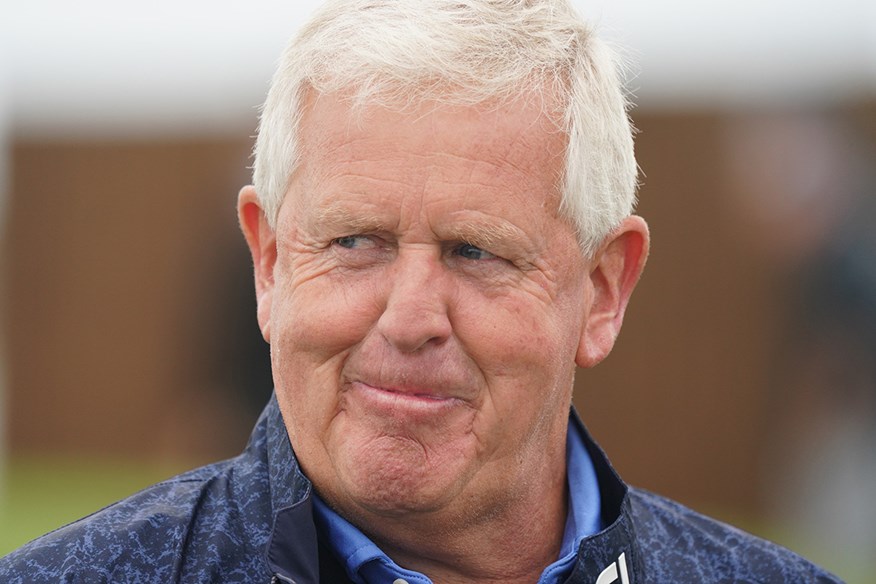Colin Montgomerie exclusive: ‘I’d love to qualify for The Open Championship at Royal Troon’
Last updated:
The Full Monty: Colin Montgomerie on his former agent Guy Kinnings succeeding Keith Pelley, being heckled by fans in America, and why his Ryder Cup captaincy was such a ‘nightmare’
Colin Montgomerie is speaking from his home in Berkshire, trying to tear himself away from the golf on TV. The Scot isn’t commentating today, but switching off doesn’t come easily for a man who wears many hats as a golfer, designer, and a newlywed grandfather of two. He’ll be heading to the gym after our chat and is already dreaming about teeing it up for the final time at The Open later on this year.
But before we get into that – and his revised retirement plans – there are other conversations that need to be had, including those about his former agent, Guy Kinnings, taking over as CEO of the DP World Tour, the reason he never joined the PGA Tour, and whether the 37 times table really did help him win a Ryder Cup match.
There’s really only one place to begin…
Q. Let’s talk numbers, specifically the 37 times table. Is it true that you used to recite it while playing?
I still do!
Q. Why 37?
Because 37 is very, very difficult. That was the whole reason. I had a sports psychologist working with me, called Hugh Mantle, who was at John Moores University in Liverpool. He actually got an OBE for his work with the British Olympic team. He wanted to get me away from thinking about where I was, the enormity of the situation.
It goes way back to the 2002 Ryder Cup, on the first tee. Sam Torrance had put me out first in the singles at the Belfry and it was a big deal. I’d already got three and a half points out of four and expectations were high that I would get a point. I was saying to him, “This is a lot to cope with.”
It was eight-all, game on, and we had lost in 1999. I was as nervous as anyone, so he said, “Right, recite your 37 times table. And as soon as you get on the tee, even before Ivor Robson introduces you, just keep reciting your 37 times table.”
So there I was, standing next to my playing partner, Scott Hoch, with Sam Torrance and Curtis Strange watching on, and all the time I was counting 37, 74, 111, 148. I was going through it all. I wasn’t interested in what they were saying or what was happening. I was taking my mind away from the situation and I hit my 3-wood 308 yards. I’ve never hit my 3-wood within 20 yards of that distance. I hit the green and holed the putt for a birdie. And I won 5&4. It was one of those days where I felt safe because I had this safety net of the 37 times table.
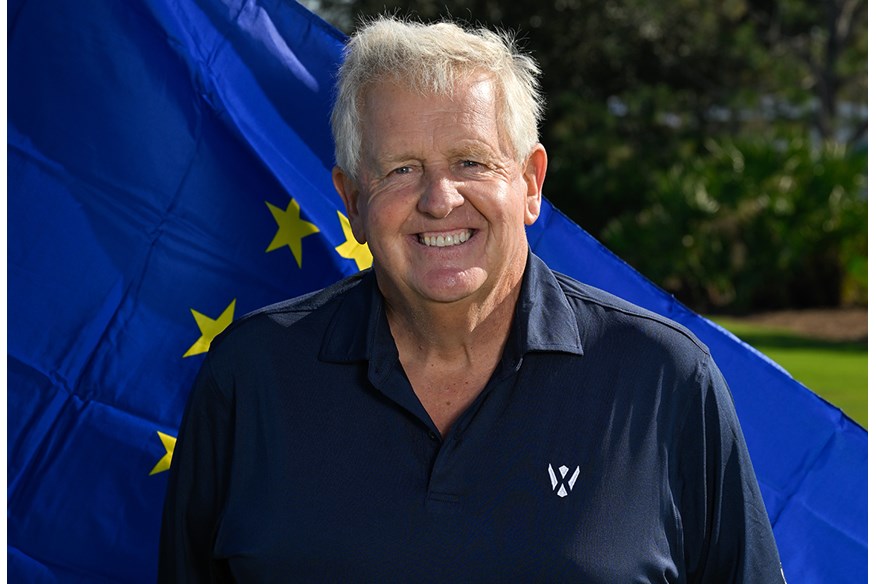
Q. In a report written by a statistics expert in 2014, you were named the greatest Ryder Cup player in history. Why did matchplay always seem to bring out the best version of Colin Montgomerie?
I hate losing. I always have. I was a terrible loser at anything, it didn’t have to be golf, and the Ryder Cup
was the perfect medium for me to show that off really. I did not like to lose, especially when I was playing for somebody else.
OK, I won the World Match Play but I lost more than I won there, but I didn’t lose that much in a team event. Also, I enjoyed it, and I’m a big believer that if you enjoy something, you’re usually quite good at it. And secondly, I wanted to win for my teammates because I knew how hard they were trying. I never wanted to let them down.
You’ve still got to play the golf, of course, but I am convinced that if most amateurs play the way I did
in matchplay and hit their putts a foot harder, they’d be amazed how many go in. You’ve got to be positive in matchplay and I did putt very well by hitting the ball slightly firmer.
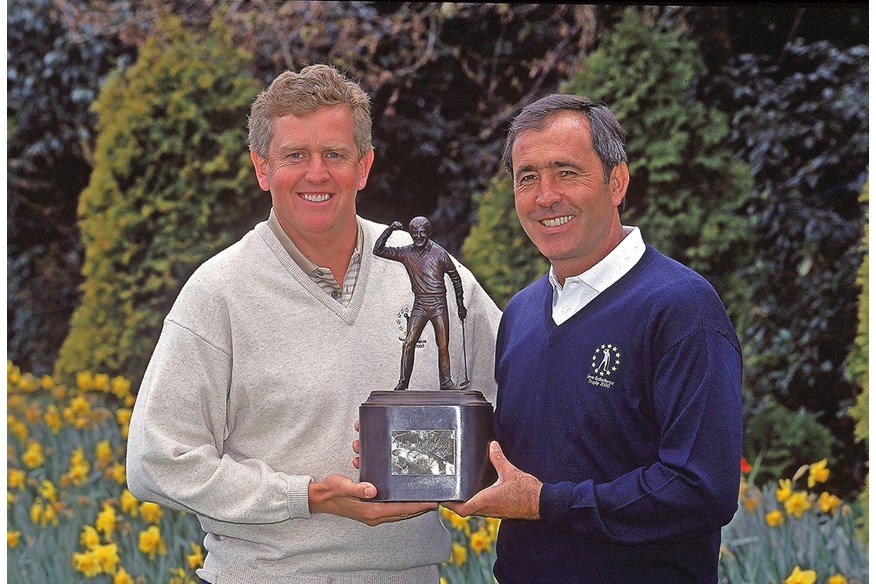
Q. Is there a particular Ryder Cup which really stands out for being the most memorable for you?
Well, ’97 was great. I think we all felt that we were doing it for one man: Seve. I happened to be the last match left on the course, so that was a delight. But I would probably go for 2004. That was the only Ryder Cup I was picked for.
Langer was the captain and he put me out first with Padraig Harrington against Woods and Mickelson.
I birdied the first hole and we went one up. I also finished that Ryder Cup by holing the winning putt, so I was the bookend of that particular Ryder Cup. It was very special.
Bernard Langer is a very good friend of mine and I’m sure he revived my career because that gave me the initiative to go on and win the Order of Merit again in ’05.
And then of course captaining the team was a very different scenario. I’ve never been to a golf tournament and left my golf clubs at home. Relying on others for your so-called success. You would much rather do it yourself.
Q. Did you prefer playing to captaining, then?
Oh, yes, playing. Captaining was a nightmare. If you speak to Woosnam, Sam Torrance, Langer, Donald,
I think they would probably feel the same. I remember the first morning, I sent Lee Westwood off with Martin Kaymer at Celtic Manor, and I was waiting for group No.2 to come along. In that moment it felt like I had lost control. As soon as a ball was hit, it was up to them. They were in control of my and Europe’s destiny. I had never had that feeling before.
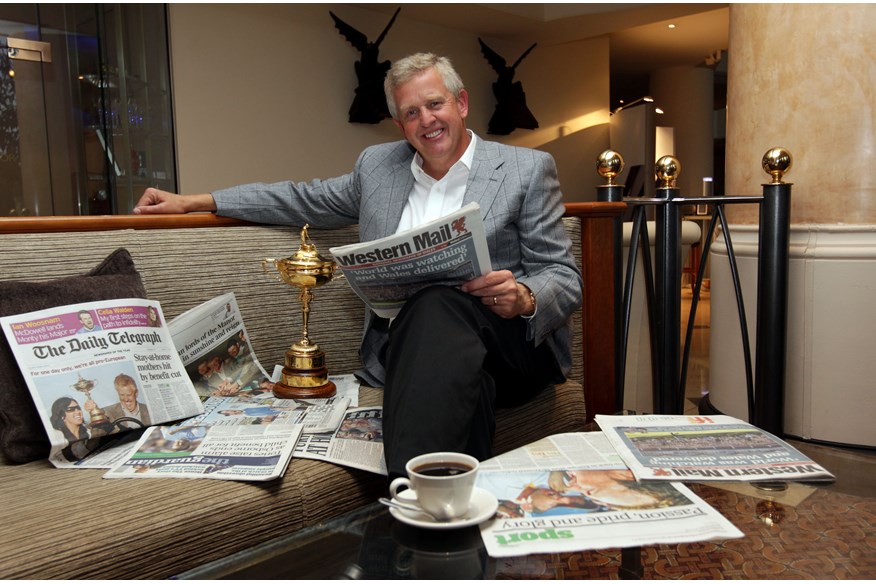
Q. Did you want to do it again after Celtic Manor?
No. I spoke to Sam, Woosnam and Langer – three guys I have huge respect for – and they said, “Why put yourself up for another one? Why put yourself up for a fall?” If you win and are fortunate, you leave it alone. Langer was instrumental in telling me that.
Q. Has Luke Donald made a mistake in doing it again?
No, I don’t think he has. It is a very different scenario from my time. All the vice captains I had were the next four captains of the Ryder Cup – Olazabal, McGinley, Clarke and Bjorn. And, of course, the two captains after them – Harrington and Donald – actually played for me. But the reason Luke Donald has taken it again is because we’ve lost five potential captains of that Ryder Cup – Westwood, Garcia, Poulter, McDowell and Stenson. Now I’m not saying there was no one else, but Donald was so successful and popular, why not do it again?
Q. You came out of university with a degree in business management and law. That means you’re well qualified to comment on how the DP World Tour has been run. How do you view the strategic alliance with the PGA Tour? Is it weighted equally?
No, I don’t think it is weighted evenly. The PGA Tour is the Tour. Over the last 20 years, anybody of any substance from Europe has gone over to play in America. The prize funds have gone extraordinarily high, so it’s not equal.
Europe have done very well to get 10 cards per year to qualify for America and players have already proven themselves, like Matthieu Pavon and Nicolai Hojgaard. It proves the European Tour is deeper than anyone gave it credit for; it’s just a shame that every year we are going to lose our better players. That can only weaken it.
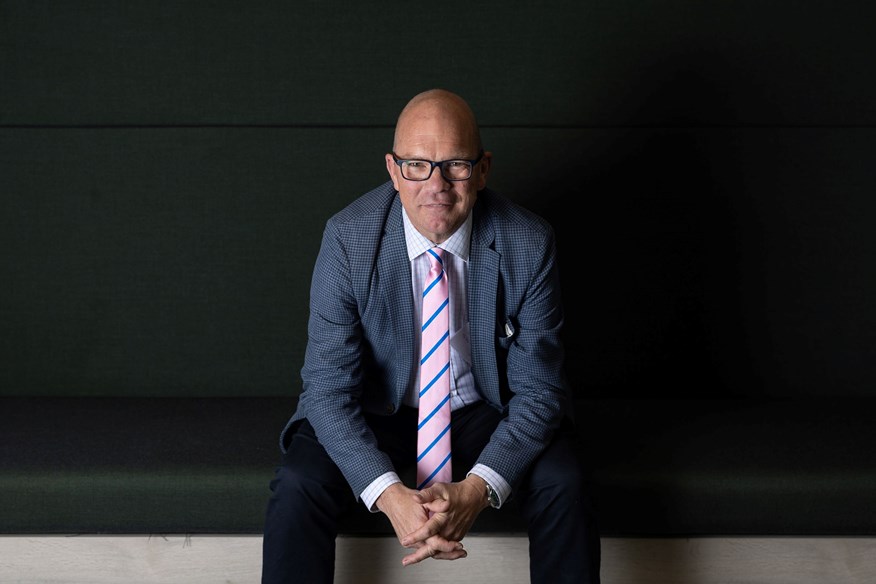
Q. You know Guy Kinnings better than most. Has he got one of the hardest jobs in golf as the new CEO?
Yes, I think Guy Kinnings does have one of the hardest jobs in golf. But he is a very, very intelligent guy. You don’t get honors in classics at Oxford University by not being very astute and very clever. I think he’ll do a very good job but it’s not going to be easy.
Q. Let’s talk about how the Order of Merit is structured. Is it right that you can play six events outside the Majors and still win it?
I know what you mean. Collin Morikawa won the US PGA and he wins our Order of Merit. It doesn’t seem quite right, does it? It has changed, there’s no question it has. I had to play all my golf in Europe to win the European Order of Merit. The world events have come into it, the Majors and the Rolex Series events.
With Rory winning in Dubai, he’s way ahead. You’d have to win five Bahrain Championships to overtake him. But as long as the best player in Europe that year wins the Order of Merit, I guess it’s OK. And you have to say Rory is the best player in Europe, the best player in the world.
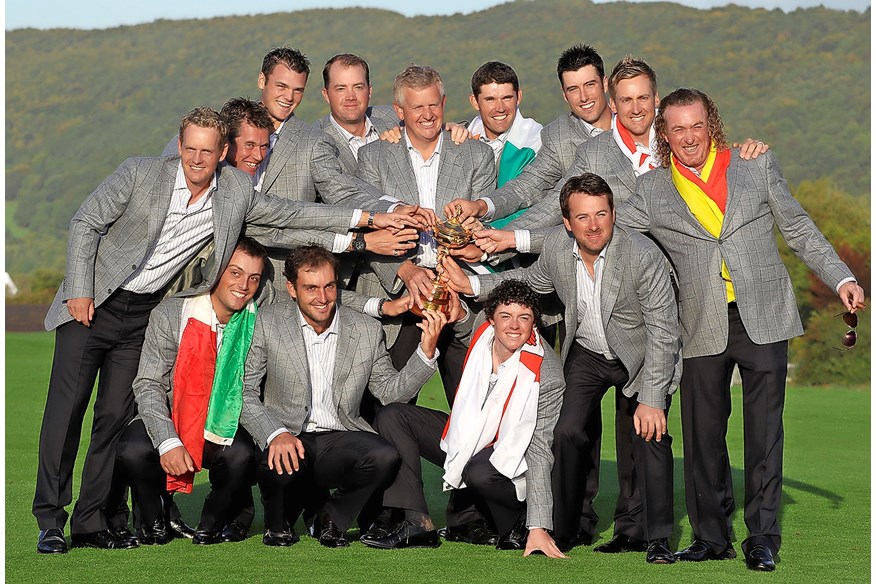
Q. For a long time you were the European Tour’s dominant force, with 31 wins and eight Order of Merits. Was the hardest part finding somewhere to store the trophies?
(Laughs) They are all over the place. I do have a trophy cabinet. There are four series of trophies I’m proud of, there’s four sections to it, if you like. The eight Vardon Trophies are top, the eight Order of Merits. They are very special, especially as I’m the only player to have that many, though Rory is catching up quickly.
Then it’s the nine Ryder Cups. Every time you play in the Ryder Cup you get a replica whether you win or lose. Now, I only played in eight, but I got given a ninth when I was captain.
Third comes the three PGA trophies that I won in a row at Wentworth, ’98, ’99 and 2000; the pinnacle of my career. And finally, it’s the US Majors – the two Senior PGA Championships and one US Senior Open. I rank them in categories really, so they’re the four main ones.
Q. Which one is most special to you?
The third PGA Championship at Wentworth. You’re talking 24 years ago now, but no one had done it before. So, it was something very special. When you think of who was second on that particular occasion, Darren Clarke and Lee Westwood, it meant a lot to me to beat the guys who were coming through.
When I started off winning the Order of Merit, it was against the likes of Faldo, Langer, Seve, Olazabal, Lyle, Woosnam. Then it moved away from them and it became Harrington, Donald, Clarke… those guys were all my competition.
To win three in a row gave me a little feeling of what it was like for Tiger to win Bay Hill eight times or Firestone eight times. It’s amazing to think that he was doing that very easily. I was doing it with great difficulty.
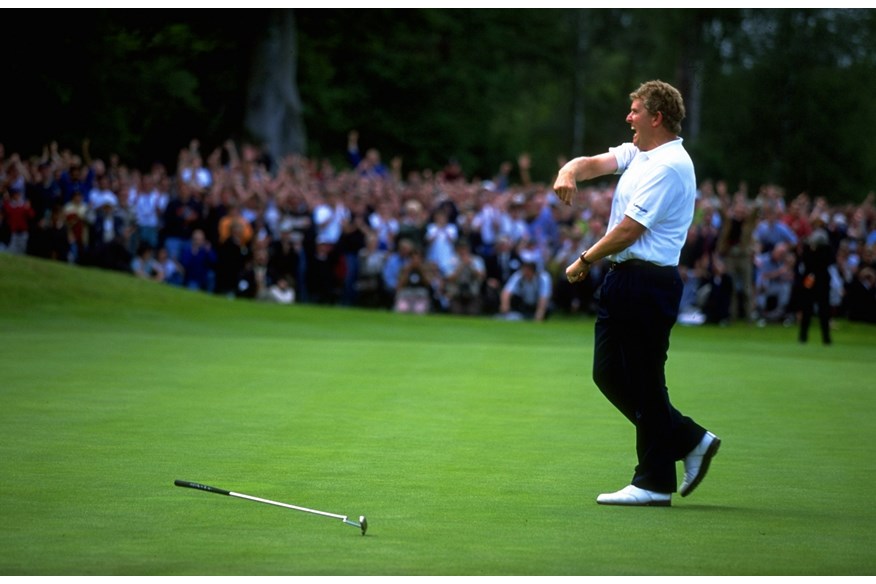
Q. Despite all the success you had, you never played a full season on the PGA Tour. Why not?
I never joined the PGA Tour. I got married at 27 and three children were born within five years. That prevented me really from going to America. Plus, there wasn’t the difference in prize money that there is now. We were playing for about 50 or 60 percent of the American fee.
I was very happy doing what I was doing in Europe. The first time I joined the PGA Tour was when I turned 50 and joined the Champions Tour. I used to go over, as all the top players did, for Bay Hill, TPC, the Masters. I played about six times a year on an invited basis because of my World Ranking.
Q. You still made 142 starts and yet you never won once. Why do you think you struggled to get over the line on the PGA Tour?
I should have won. Of course, I should have, I know that. But… Every time that you raise a trophy, you never say you were lucky but something would always work in your favor, whether it was a little bit of luck on your side or bad luck on your competitor’s side. I guess it just never materialized for me in the US.
Every time I was second in those five Majors, there was somebody that played better or hit a better shot at the right time. There was only one occasion when I lost it myself, which was Winged Foot in 2006.
So, I have to say that luck wasn’t on my side and to win a tournament you have to be lucky. It’s a terrible word to use, but the door was ajar many times and it just didn’t open fully.
That’s why I was so delighted when, in 2014, my second year on the Champions Tour, I won two Majors. I was so proud to get over the line, especially as Bernhard Langer was second to me the first time and Tom Watson the second. I’ve won seven times now on the Champions Tour and I’m very honoured to have done that.
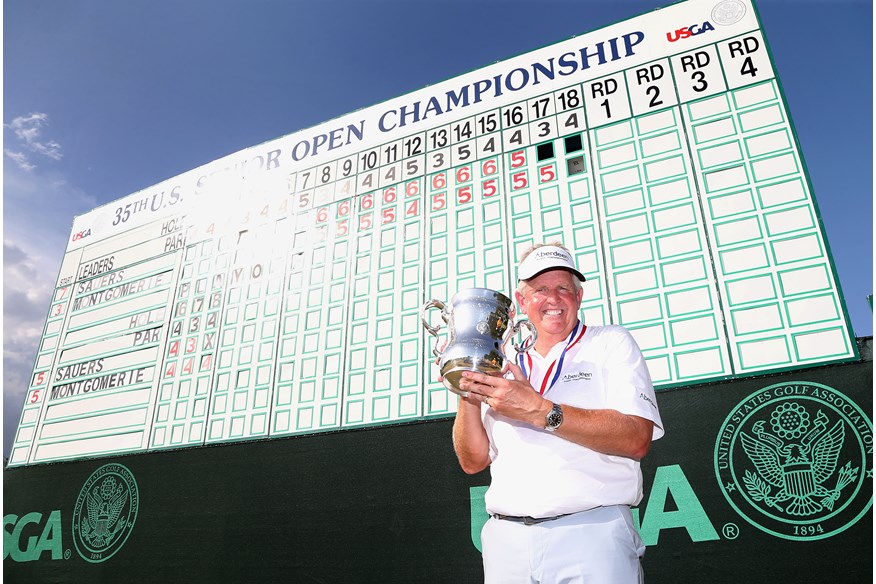
Q. During your prime, you were heckled relentlessly in the US. Did you actually enjoy going over there to play?
No, I didn’t. I don’t think you can enjoy that. I enjoy it now because it is very different, but I’m not the threat (to American players) that I probably was back then. I think it did hurt the odd performance. You want people to support you when you are fighting against 155 other golfers, not be so vocally against you. It was quite difficult but at the same time I did OK. I have no regrets at all, but it would have been easier without it.
Q. You’re known as the greatest player to never win a Major. Do you treat it as a backhanded compliment?
I take it as a huge compliment, yes. I wouldn’t say it’s a backhanded compliment.
Q. It’s often said that Andy Murray played tennis in the wrong era because of Roger Federer, Rafa Nadal and Novak Djokovic. Do you feel the same way about playing in the Tiger era?
I’m sorry, but we did. Ever since ’97, when Tiger won that Masters, things changed. And I speak for Ernie Els, I speak for Phil Mickelson. I speak for all the guys that were coming through at that stage, myself included.
Trying to win Majors became very, very difficult because he was there. Finishing second at St Andrews (in ’05), I did a hell of a job to beat the other 154 guys. I was number 155 and he unfortunately was 156. That was it. It was easier when he was injured or wasn’t playing.
We would all think, ‘Thank God he’s not here. We have a chance’. But it was a difficult era to win Majors. He was taking one or two per year – and there are only four of them.
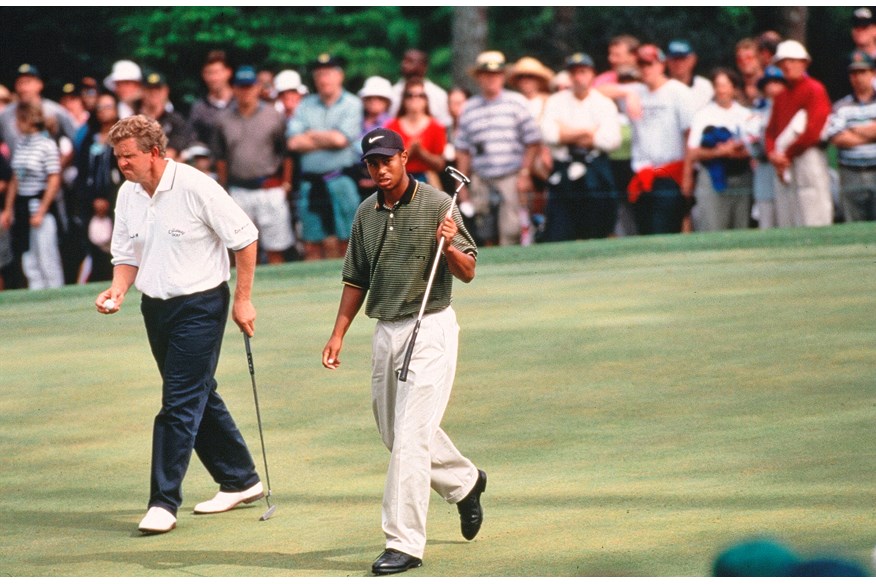
Q. Tiger obviously went on a run of ticking off Majors and completing the Grand Slam. Did you think he was going to beat Jack’s total of 18 Majors?
Nicklaus’ 18 was as far away as the moon. It never seemed reachable until Tiger won four in a row. I think we all thought he could do it then, but life panned out as it did for Tiger. If he had stayed healthy, I think he could have caught him.
The thing about Tiger is he knew he was better than us. The one thing he probably didn’t know is that we knew he was better than us. And that was a huge issue for us and a positive for him. At St Andrews in 2005, when I finished second to him, I started late and Tiger was already at -5, having come in with a 67. It was almost like, ‘Are we playing for second place already?’ And that’s what it was like a lot of the time.
Q. Do you have any regrets about your own career?
No, not one. If I could have one shot back, I would love my second shot at Winged Foot in 2006 into the 72nd green.
Q. You once said that you would never play senior golf. Then you revised that statement and said you would finish playing when you were 60, the age you are now. Would you care to revise that statement now?
Yes, we need a third revision! But what it was, I saw my parents at 50 and they were a different generation completely. If you get out pictures of your grandparents, it’s amazing how old they look or how old they seem. We are a very young generation. Believe it or not, I’m just about to go to the gym. I’m eating healthily, we’re traveling the world. I think we’re much younger than I anticipated being. That’s why I didn’t give up when I was 50.
And here we are, 10 years later, and I’m looking at Langer, he’s 66. I’m looking at Couples, he’s 63. These guys are still very competitive at that age and I feel I’m their equal. I wouldn’t still be doing this if I didn’t enjoy it. I wouldn’t still be doing it if I wasn’t competitive. And I wouldn’t still be doing it if I didn’t think I had a chance of winning.
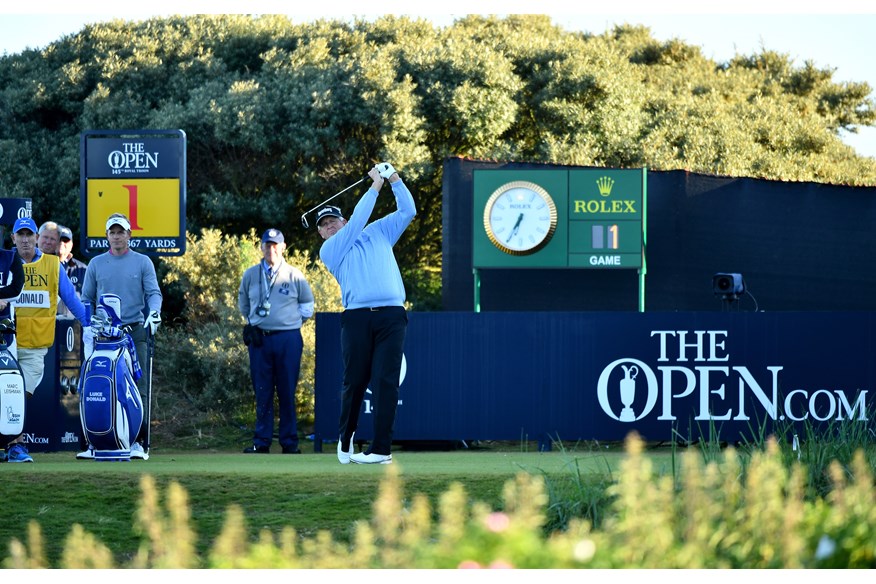
Q. With the Open coming back to Royal Troon, a club where you’re an honorary member, are you tempted to try and qualify?
Yes, I am. The last time it was at Troon, in 2016, I qualified at 53 years old and hit the opening tee shot. I would love to have the opportunity again. But I’ve got to get back very quickly from one of our tournaments. The US Senior Open is in Newport, Rhode Island, and the Open qualifier, I think, is on the Tuesday, so, I’ve got to get back to the UK Sunday night into Monday. I’ll be jet-lagged to hell, but I’d like to try and do it. One more time.
Q. Do you still feel you can mix it with the young guns?
On a links course, if it’s fast and running, yes, I can. If it is wet and a parkland and I need to fly the ball 320 yards, no. But on a links course it gives me an advantage in a way. Although I doubled the first hole in 2016, I managed to make the cut, which was great. But I really do think I am a better player now at 60 than I was at 53. I think I have learned more.
Q. How long do you see yourself carrying on for?
As long as I feel competitive. If I go to a tournament, thinking that the best I can do is 15th, that will be it.
The best I can do now is win, therefore I’m going to try and do exactly that.
-
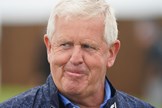 Colin Montgomerie wants a final crack at The Open at Royal Troon, where he is an honorary member.
Colin Montgomerie wants a final crack at The Open at Royal Troon, where he is an honorary member.
-
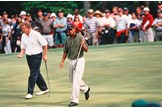 Colin Montgomerie had a front row seat for Tiger's victory at the 1997 Masters.
Colin Montgomerie had a front row seat for Tiger's victory at the 1997 Masters.
-
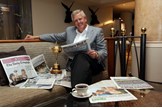 Colin Montgomerie reliving Europe's Ryder Cup victory in 2010.
Colin Montgomerie reliving Europe's Ryder Cup victory in 2010.
-
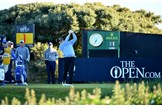 Colin Montgomerie hit the opening tee shot at Royal Troon in the 2016 Open Championship.
Colin Montgomerie hit the opening tee shot at Royal Troon in the 2016 Open Championship.
-
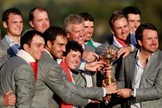
-
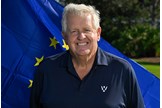 Colin Montgomerie never lost in a Ryder Cup singles match, winning six and halving two.
Colin Montgomerie never lost in a Ryder Cup singles match, winning six and halving two.
-
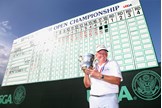 Colin Montgomerie celebrates winning the US Senior Open in 2014.
Colin Montgomerie celebrates winning the US Senior Open in 2014.
-
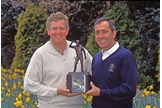 Colin Montgomerie played under Seve at the 1997 Ryder Cup at Valderrama.
Colin Montgomerie played under Seve at the 1997 Ryder Cup at Valderrama.
-
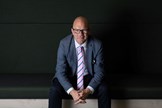 Guy Kinnings replaced Keith Pelley as DP World Tour CEO at the start of April 2024.
Guy Kinnings replaced Keith Pelley as DP World Tour CEO at the start of April 2024.
-
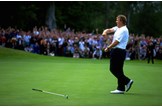 Colin Montgomerie celebrating the first of three victories in successive years at Wentworth.
Colin Montgomerie celebrating the first of three victories in successive years at Wentworth.
-
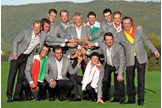 Colin Montgomerie captained Europe to Ryder Cup success at Celtic Manor in 2010.
Colin Montgomerie captained Europe to Ryder Cup success at Celtic Manor in 2010.
